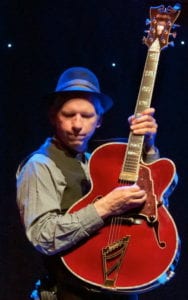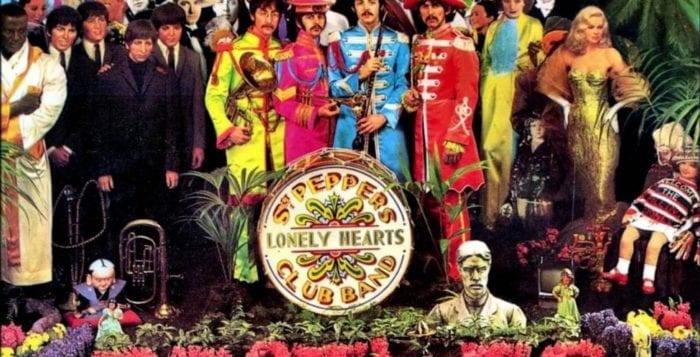By Kevin Redding
It was 50 years ago today … on June 1, 1967, that the Beatles released “Sgt. Peppers Lonely Hearts Club Band” in the United States and completely changed everything: music, culture, themselves, how people viewed and analyzed rock ’n’ roll.
The incredibly ambitious and experimental 13-track album — on which John Lennon, Paul McCartney, George Harrison and Ringo Starr abandoned their traditional mop-top image and sound in favor of a more conceptual, weird, wholly new product with a scope and style that hadn’t been attempted before by them or anybody else — helped usher in the Summer of Love and set the tone for the rest of the decade.
While many older albums, especially when they fall on younger ears, tend to lose their might over time, “Sgt. Pepper” still stands strong, and sounds just as vibrant and fresh as ever. To this day, it’s argued to be the greatest, if not most influential, album of all time.

Favorite Beatles song:
‘A Day in the Life’
“It was just absolutely groundbreaking,” Peter Winkler, a retired Stony Brook University professor of composition and theory and popular music, said, recalling the first time he listened to the record.
Winkler, who taught one of the very first rock music classes at the university in 1971, said he’ll never forget the week it came out and how stunned he was upon hearing the album’s epic finale “A Day in the Life” — “I had never heard anything like that before,” he said, “with that big orchestral roar — that had never happened on a pop record before.”
“Everybody was listening to the album, everybody was talking about; that doesn’t happen these days where one particular record is having that impact on everyone,” Winkler continued. “It was incredibly innovative and made this enormous splash around the world. It expanded the vocabulary of pop music in such a dramatic way. It was just a game changer. Everything that followed — Genesis, Yes, Pink Floyd — came straight from ‘Sgt. Pepper.’”

Favorite Beatles song:
‘A Day in the Life’
Pete Kennedy, a New York-based singer-songwriter who regularly performs at The Long Island Museum in Stony Brook, echoed Winkler’s excitement over the innovation of the album, comparing it to the release of Geoffrey Chaucer’s “The Canterbury Tales,” a grandiose, cohesive novel, amid decades of mere folktales in the Middle Ages. “That’s kind of what the Beatles did with this. They put rock music together in a much more serious way than anybody had before. It marked the beginning of the rock world that still exists now … they were already so well known and could’ve coasted along doing what they’d been doing but they took this step instead,” Kennedy said.
The album’s release coincided with, and legitimized, an emergence of rock journalists and professional critics who recognized the genre as something to be taken seriously, a notion that would’ve been inconceivable beforehand. A month before, renowned classical composer Leonard Bernstein even hosted an hour-long CBS special called “Inside Pop: The Rock Revolution” referring to the Fab Four as a group whose songs were “more adventurous than anything else written in serious music today.”
Just before the album came out, Kennedy explained, he and a lot of other people thought the Beatles were a done deal. In August 1966, the group performed their final live concert, having had enough of the screaming girls and a hectic atmosphere wherein people were burning their records after Lennon referred to the band as being “bigger than Jesus,” choosing to work exclusively from the studio from then on.

Favorite Beatles song:
‘Getting Better’
One June afternoon the following year, Kennedy walked into a record shop and saw an unrecognizable band, dressed in colorful military costumes and surrounded by a slew of famous faces and flower-power imagery.
“Just seeing that pop-art album cover, with no advanced warning and them with mustaches, it might not seem like a big deal, but it really was because their appearance was such a big part of them,” he said. “The Beatles hairstyle and matching suit … now they looked like hippies, and it was sort of shocking.”
Norman Prusslin, the first station manager of WUSB and director of the media minor at Stony Brook, said of the infamous cover, “it was almost like their alter ego, a way for them to step out of being the Beatles … it was also one of the first times pop records had lyrics printed on the back.”
“It was a very different record, musically, it wasn’t your typical Beatles record up to that point,” Prusslin, who saw the group live in 1964, said. “It felt continuous,

Favorite Beatles song:
‘Within You Without You’
like one long thing … I think the concept of the album, rather than being just a collection of songs, became a pallet for an entire creative journey that became influential to other bands that came later. It maximized studio equipment to its fullest potential at the time and contained exploratory, autobiographical lyrics that encouraged other bands to free themselves and try different things and not be set in the two minutes and 50 seconds standard pop hit duration.”
Charles Backfish, the host of WUSB’s “Sunday Street” program, highlighted the album’s coinciding impact with the rise of FM radio. While AM was the dominant form of radio in the ’60s, with FM merely broadcasting whatever AM played, an FCC regulation went into effect in January 1967 declaring each dial needed to have different programming.
“So it opened up the option for FM stations to do something different,” Backfish said. “While AM played classic top 40 songs, FM started to explore different music and some things happening in the rock scene at the time lent themselves to being played on there … and ‘Sgt. Pepper’s’ is a perfect example. There were no singles released from the album, each song segued into another, and so it’s an album that found a real home on FM radio and helped drive the popularity of FM radio.”





